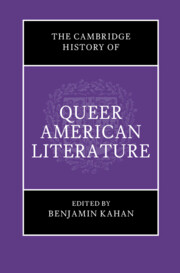Book contents
- The Cambridge History of Queer American Literature
- The Cambridge History of Queer American Literature
- Copyright page
- Contents
- Figures
- Tables
- Contributors
- Acknowledgments
- Introduction
- Part I Synchronic Histories of American Sexuality
- The Sexuality of American History
- 1 Trans/Atlantic Origin Stories
- 2 Queering the Founding; Or, the Revolution in Sex
- 3 Whither the Queer History of Slavery?
- 4 Queering Immigration and the Social Body, 1875–1924
- 5 The Queerness of World War II
- 6 Queer Bonds of Cold War Sexuality
- 7 “The Dead Never Die”
- 8 Fiction in the Post–Lawrence v. Texas Era, or Inventing Heteronormative Queerness
- Queer Literary Movements
- Part II Diachronic Histories of American Sexuality
- Part III Queer Methods
- Index
3 - Whither the Queer History of Slavery?
from The Sexuality of American History
Published online by Cambridge University Press: 17 May 2024
- The Cambridge History of Queer American Literature
- The Cambridge History of Queer American Literature
- Copyright page
- Contents
- Figures
- Tables
- Contributors
- Acknowledgments
- Introduction
- Part I Synchronic Histories of American Sexuality
- The Sexuality of American History
- 1 Trans/Atlantic Origin Stories
- 2 Queering the Founding; Or, the Revolution in Sex
- 3 Whither the Queer History of Slavery?
- 4 Queering Immigration and the Social Body, 1875–1924
- 5 The Queerness of World War II
- 6 Queer Bonds of Cold War Sexuality
- 7 “The Dead Never Die”
- 8 Fiction in the Post–Lawrence v. Texas Era, or Inventing Heteronormative Queerness
- Queer Literary Movements
- Part II Diachronic Histories of American Sexuality
- Part III Queer Methods
- Index
Summary
This essay interrogates the queer history of slavery through close readings of nineteenth century literature. Specifically the texts Incidents in the Life of a Slave Girl (1861) by Harriett Jacobs, Our Nig (1859) by Harriett E. Wilson, “The Heroic Slave” (1853) by Frederick Douglass, as well as the pro-slavery text, The Partisan Leader (1836) by Nathaniel Beverly Tucker are placed in conversation and tension to examine how cruelty against slaves and free Black people expose the vexed queer encounters of the antebellum period. Rather than thinking of queerness as solely same-sex sexual acts, this argument extends a theory of racial sexuation that considers violence extended by masters, mistresses, and non-slave owning whites as imbued by fantasies and desires about Blackness as sexually open, unruly gendered, and innately erotic. Lastly, in reading texts pertaining to the conditions of slaves and free Black people, this essay interrogates how the racial sexual relations that are present under slavery extend beyond the confines of the plantation.
Keywords
- Type
- Chapter
- Information
- The Cambridge History of Queer American Literature , pp. 72 - 88Publisher: Cambridge University PressPrint publication year: 2024

